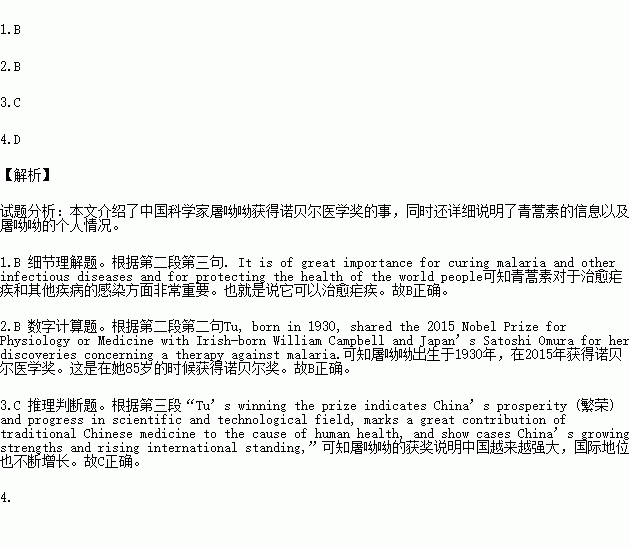题目内容
The landmark success of herbal (药草的) expert Tu Youyou, the first Chinese woman national to win a Nobel prize in science, has aroused an extreme sense of national pride and hopes on the future of traditional Chinese medicine (TCM). Tu, born in 1930, shared the 2015 Nobel Prize for Physiology or Medicine with Irish-born William Campbell and Japan’s Satoshi Omura for her discoveries concerning a therapy against malaria.
She discovered Artemisinin(青篙素), a drug that has significantly reduced the death rates for patients suffering from malaria(疟疾). “Artemisinin is a gift for the world people from the traditional Chinese medicine. It is of great importance for curing malaria and other infectious diseases and for protecting the health of the world people,” Tu said in Beijing. “The discovery of Artemisinin is a successful example of collective research on traditional Chinese medicine. The prize winning is an honor for China’s science cause and traditional Chinese medicine in their course of reaching out to the world.”
“Tu’s winning the prize indicates China’s prosperity (繁荣) and progress in scientific and technological field, marks a great contribution of traditional Chinese medicine to the cause of human health, and show cases China’s growing strengths and rising international standing,” Premier Li Keqiang said in a congratulatory letter Monday evening.
In 2011, Tu became the first scientist on the mainland to win America’s respected Lasker Award for her discovery of a new method to malaria treatment,which are given annually to people who have made major advances in the understanding, treatment, cure and prevention of human diseases since 1945. Graduating from the Beijing Medical College in 1955, she is chief researcher and professor at the Beijing-based China Academy of Chinese Medical Sciences.
On China’s Twitter-like Sina Weibo, the news has been sent by at least tens of thousands of users and received many “thumb-ups.” Netizen(网民)“Xiaoxie” wrote, “ Now I feel truly proud of being a medical student.”
1.We can learn from the text that Artemisinin has a good effect on ______ .
A. reducing the death rates of cancer patients.
B. curing patients suffering from malaria.
C. declining the infection rates of diseases.
D. preventing people from being infected with malaria.
2.How old was Tu You you when she received Lasker Award?____
A. 85 B. 81 C. 45 D. 25
3.Which of the following is Not True?___
A. Tu’s winning the prize has aroused a strong feeling of nation pride in China.
B. Premier Li Keqiang praised medical researchers for their work and achievements.
C. The congratulatory letter shows that both China’s strengths and international standing have reached the highest rank around the world.
D. The Lasker Award is awarded to people for their excellent contributions to medical science every year.
4.What type of writing is this text? ____
A. An advertisement B. An announcement
C. A speech D. A report

